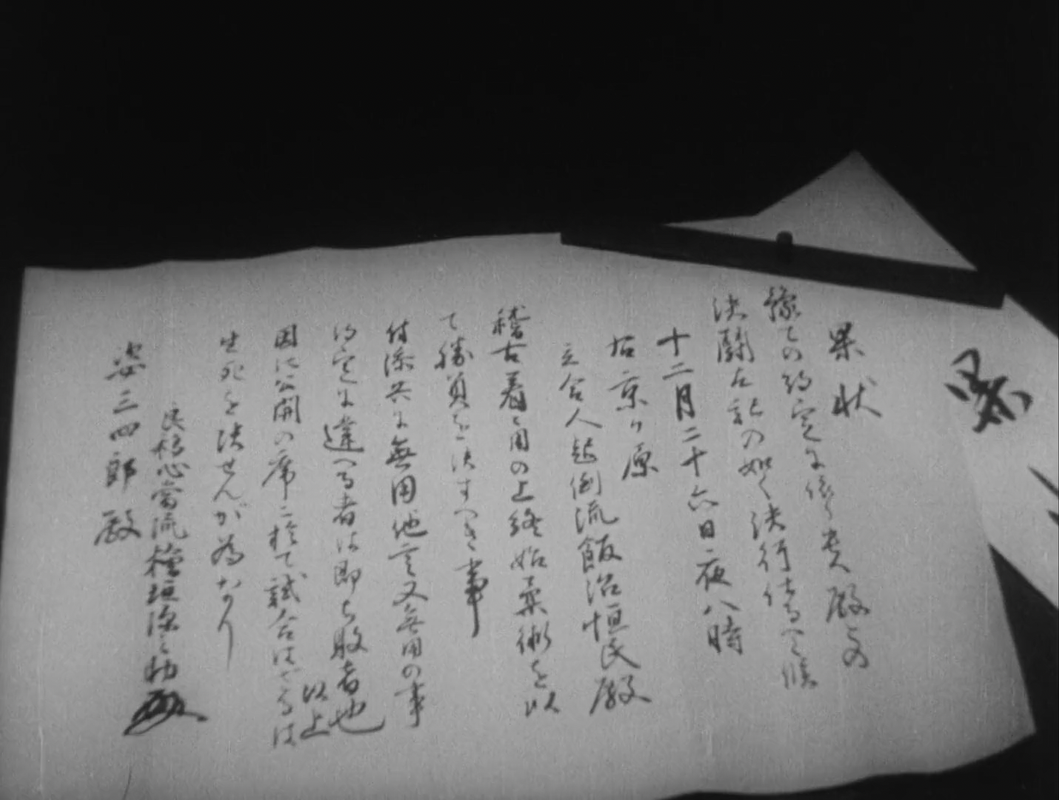Que la bête meure [The Beast Must Die] (Claude Chabrol, 1969)
Jan
3
.png)
A hand writes 3 janvier in red ink on quad paper. DP: Jean Rabier.
BookAdaptation
“On the night of December 26, at 8:00 on Ukyō-ku.”姿三四郎 [Sugata Sanshirō / Judo Saga] (Akira Kurosawa, 1943)
Dec
26
8 p.m.

A letter beckoning to come to Ukyō-ku, on December 26, at 8 o'clock. DP: Akira Mimura.
“Sloane! Be lucky!”Nowhere to Go (Seth Holt + Basil Dearden, 1958)
Dec
22
Tue
.png)
A man checks into a hotel. A wall calendar reads December 22, a Tuesday. DP: Paul Beeson .
– Paul Gregory
“He's growing! Look! See how he's growing! I have seen the Lord! The Lord! The Lord!”Die Blechtrommel [The Tin Drum] (Volker Schlöndorff, 1979)
Dec
21
winter solstice
.jpg)
Little Oskar with his tin drum. DP: Igor Luther.
Something short for winter solstice.
– Schugger-Leo
On the eve of World War 2, little Oskar – just three years old – decides he doesn't want to grow anymore.
“What is that? What is that I hear? Where's it coming from? I hear a siren, but I don't see any fire, I don't see any smoke. Whenever there's a siren, it means there's a fire, but I don't see any smoke. That siren. Where is it coming from? Where's that sound coming from?”Santa and the Ice Cream Bunny (Richard Winer + Barry Mahon, 1972)
Dec
20

A bunch of screaming children on top of a red firetruck stand right behind the driver, a stoic person in a pink bunny costume. DPs: William Tobin & Richard Winer.
– Santa Claus
“Laugh, my friends. Laugh with me, laugh for me, because I dream for you.”Le voyage dans la lune [A Trip to the Moon] (Georges Méliès, 1902)
Dec
19
Apollo 17
.gif)
A gif from the hand-coloured edition that is now in the Filmoteca de Catalunya. Poor Mister Moon has the adventures' rocket stuck in his eye. DPs: Théophile Michault & Lucien Tainguy.
The Moon (any moon) to commemorate the end of the final man-manned moon landing.
– Georges Méliès, 1937
In true Méliès style, a wild menagerie of showgirls and scientists meet on the Moon in this groundbreaking sci-fi spectacle.
“Écoute les orgues
Elles jouent pour toi
Il est terrible, cet air-là
J'espère que tu aimes
C'est assez beau, non ?
C'est le requiem pour un con”Le pacha [Pasha / Showdown] (Georges Lautner, 1968)
Dec
19
.png)
Jean Gabin and Dany Carrel in a still on the cover of Serge Gainsbourg's Requiem pour un con 7” (via). DP: Maurice Fellous.
– Serge Gainsbourg, Requiem pour un con (1968)
Wojna Światów – Następne Stulecie [The War of the Worlds: Next Century] (Piotr Szulkin, 1981)
Dec
18
1999

Reporter Iron Idem (Roman Wilhelmi) bringing the news. DP: Zygmunt Samosiuk.
“A geisha’s lie is not a real lie. It’s a cornerstone of our profession.” 祇園囃子 [Gion bayashi / Gion Festival Music] (Kenji Mizoguchi, 1953)
Dec
15
茶
.jpg)
Studying the tea ceremony, accompanied by director Mizoguchi (via). DP: Kazuo Miyagawa.
Having tea*
– Miyoharu
* the Bales 2025 Film Challenge for December has a few dateless themes. This is one of them.
“Kneel before her son. I've had a dream. She's the incarnation of the Goddess, Kali.”দেবী [Devi / The Goddess] (Satyajit Ray, 1960)
Dec
13
Saint Lucy's Day
.jpg)
Doyamoyee, Kali incarnate (via). DP: Subrata Mitra.
Saint Lucy's Day: wearing a garland. Today's and yesterday's theme are virtually interchangeable.
– Kalikinkar Roy
Doyamoyee's father-in-law, and worshipper of Kali, has a dream. The young woman is the goddess' avatar. Locals come to visit the house, and Doyamoyee too starts believing in her divinity.